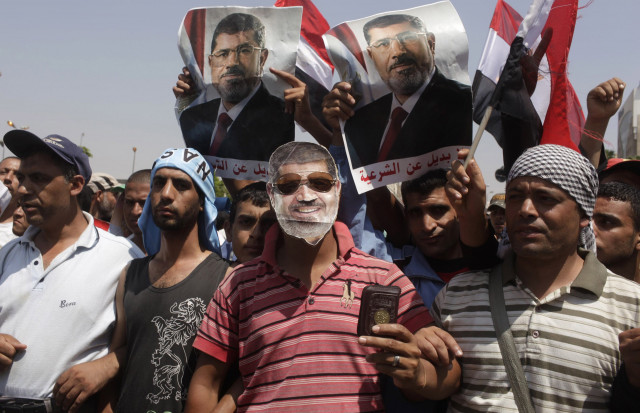Opponents of deposed Egypt leader flood Tahrir
Supporters and opponents of Morsi alike rush to Tahrir.

A supporter of deposed Egyptian President Mohamed Mursi wears a mask depicting Mursi as protesters chant slogans outside the Republican Guard headquarters in Cairo July 7, 2013. PHOTO: REUTERS
The rallies will raise the stakes as a coalition that backed Morsi's ouster wavered over the choice of Nobel Prize laureate Mohamed ElBaradei as interim prime minister to lead the country out of the bloody crisis.
They come two days after demonstrations by tens of thousands of members of Morsi's Muslim Brotherhood degenerated into violence that killed 37 people and injured 1,400 across the country.
The Tamarod movement, which engineered mass protests that culminated in the military's overthrow of Morsi on Wednesday, led calls for people to gather at Tahrir and Ittihadiya presidential palace to "complete the revolution".
The Brotherhood's Freedom and Justice Party called on Morsi supporters to converge on Rabaa al-Adawiya mosque, Cairo University and the Republican Guard headquarters.
The demonstrations, the FJP said, were to support the "legitimacy" of Morsi's election in June last year and to "reject the military coup" that ousted him.
Morsi's single year of turbulent rule was marked by accusations that he failed the 2011 revolution which ousted autocratic president Hosni Mubarak by concentrating power in his regime's hands and letting the economy nosedive.
In an interview published on Sunday, ElBaradei called for "inclusion of the Brotherhood in the democratisation process".
"No one should be taken to court without a convincing reason. Former president Morsi must be treated with dignity," the winner of the 2005 Nobel Peace Prize told German news weekly Der Spiegel.
The official MENA news agency said on Saturday that caretaker president Adly Mansour had appointed ElBaradei, only for his office to later deny any final decision had been taken.
Salafi Islamists, who gave their backing to Morsi's overthrow in a military coup on Wednesday, were holding out against ElBaradei's appointment, officials close to the talks told AFP.
Presidential adviser Ahmed al-Muslimani said ElBaradei, the former head of the UN nuclear watchdog, remained the "strongest candidate".
"He is on top of the list of names," Muslimani told AFP.
But by Sunday morning, after another round of talks, a senior Salafi politician said his Al-Nour party would not accept ElBaradei.
"Our position is simple. There are two reasons to reject ElBaradei: we need a technocratic economic figure; and we need to end polarisation on the street," said Nader Bakkar.
"We can't talk of national reconciliation and then make Morsi's most ardent opponent prime minister."
An official close to ElBaradei conceded there were fears of alienating Al-Nour, which won almost a quarter of votes in a 2011 parliamentary election, and "driving them" into Morsi's camp.
Morsi, who has been in custody since overnight on Wednesday, had issued a defiant call for his supporters to defend his "legitimacy" as Egypt's first freely elected president, in a recorded speech released shortly after his ouster.
Friday's violence erupted despite talk of peaceful protests, with Cairo and the Mediterranean city of Alexandria the hardest hit.
The bloodletting continued, with gunmen on Saturday killing a Coptic Christian priest in the Sinai Peninsula and militants on Sunday blowing up a gas pipeline to Jordan as Islamists fired on the security forces.
Russia's President Vladimir Putin warned the stand-off threatened to degenerate into a civil war.
"Syria is already in the grips of a civil war, unfortunately enough, and Egypt is moving in that direction," news agencies quoted Putin as saying.
"We would like to see the Egyptian people avoid this fate."
Moscow has previously called on all sides in the crisis to exercise "restraint".
President Barack Obama insisted overnight that the United States was "not aligned" with any political party or group in Egypt following Morsi's ouster.
"The future path of Egypt can only be determined by the Egyptian people," the White House quoted him as saying.
Former British prime minister Tony Blair said the army had no choice but to overthrow Morsi, in a column published in the Observer newspaper.
"The events that led to the Egyptian army's removal of President Mohamed Morsi confronted the military with a simple choice: intervention or chaos," Blair wrote of the mass protests calling for Morsi's ouster.



















COMMENTS
Comments are moderated and generally will be posted if they are on-topic and not abusive.
For more information, please see our Comments FAQ